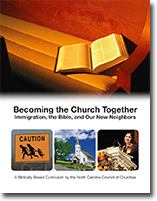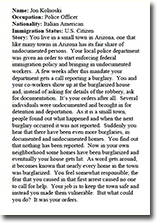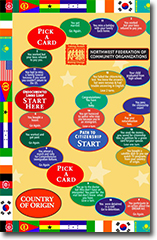Immigration, the Bible, and Our New Neighbors



Order hard copies | From the Introduction | Facilitator Guide | Immigration Links | Evaluate the Curriculum
Thanks for checking out the NC Council of Churches’ new biblically-based immigration curriculum. You’ll find everything you need on this page, including free PDF downloads, an order form for hard copies, a facilitator’s guide and links to more info on immigration issues.
From the Introduction
Together we will embark on a course to study the Bible and see how it addresses the issue of modern day immigration. Our goal will be to foster an open, honest, loving, and biblically focused conversation about this important – and controversial – topic. Each lesson focuses on Scripture, while incorporating prayer, activities, videos, and group discussion to help everyone investigate how faith in Christ affects views on immigration. Even as we study issues related to United States law and policy, our first responsibility will always be to examine God’s witness and imagine appropriate responses for our churches as we strive to be disciples of Jesus Christ together.
As a loving family, we should make our best efforts to be open and honest with one another. We invite you to be thoughtful and share your thoughts with your brothers and sisters in Christ, while also listening intently to others. Each of us should assume that we have something to learn from others. Finally, since most of the lessons focus on having conversation, please help create a “safe” space, where everyone feels welcome and loved whether they agree or disagree.
As we begin reading scripture and applying the truth to how we treat our new neighbors, we can have faith that God will be present with us and guiding us towards loving God and loving our fellow human beings in deeper ways.
Getting Started
There is a Facilitator’s Guide with more information about leading these discussions. Each participant will need a booklet. In addition to this booklet, each group will need a DVD, Character Cards and the Immigration Board Game (these materials are all shipped together). If you need to order additional materials or if you have any questions, please visit this curriculum online: www.nccouncilofchurches.org/immigration-curriculum
Language About Immigrants
Scripture teaches us that all people are made in the image of God. Like everyone else, immigrants are children of God, whom God loves enough to send Christ. They deserve the dignity and respect that we offer even our closest friends, because Jesus loves us in the same exact way Jesus loves the immigrant in our midst.
In the public sphere there are numerous terms used to describe immigrants, but it is important to think about the negative connotation that some of these terms carry. The terms “illegal” and “illegal immigrant” automatically criminalize the person, instead of the action they are purported to have committed. Shortening the term in this way also stereotypes undocumented people who are in the United States as being unruly or violent.
It is also unhelpful to use the terms “alien” and “illegal alien,” which describe undocumented immigrants as inhuman outsiders who come to the U.S. with questionable motivations. If we use such terminology, we automatically reject our neighbors before we read scripture, pray and discuss with each other. We may not be open to learning something from the Spirit. When we use the terms “undocumented immigrants” or “unauthorized immigrants” to refer to the roughly 11 million people who are in the U.S. without documents attesting that they are authorized to be here, our language reflects respect and love for all people, and we hope neutral language will enable us to hear God speak through scripture.
Please note that in many translations of the Bible, the words “alien” or “stranger” are used to refer to immigrants and foreigners. (These Hebrew and Greek terms do not carry negative implications.) Full text of all Scripture passages used in this study can be found starting on page 15 of the booklet.
About the NC Council of Churches
Since its inception over 75 years ago, the North Carolina Council of Churches has been working to put Christian values into practice in the public sphere. One of the founding issues for the Council in 1935 was opposition to segregation and support for integration; the Council has long supported vulnerable and excluded people. Today, the Council’s eighteen member denominations have over 6,200 congregations with about 1.5 million congregants in North Carolina.
The Council worked for labor and housing protection for migrant farmworkers when many of them were African Americans traveling up and down the East Coast. Our commitment to farmworkers has continued even as their demographics have changed to a primarily immigrant Latino population. This commitment has grown to include the broader issues of immigration policy – a position that remains consistent with our founding principles.
After prayerful deliberation, the Council issued a public statement in 2002 welcoming our Latino neighbors and calling on policymakers to increase Latinos’ access to higher education, healthcare and housing, and to provide drivers’ licenses without regard for immigration status. In 2006, the Council passed a statement in support of comprehensive immigration reform, saying that “Religious communities must look to our scripture and faith traditions which call us to welcome the stranger, promote hospitality, and seek justice.” The Council recognizes the complexity of these issues and respects the many views held by congregants of all denominations.
This curriculum would not have been possible without generous financial support from the Z. Smith Reynolds Foundation. We are also grateful for the individuals and organizations that contributed to this project, including: Alliance for a Just Society, Peter Eversoll, José Galvez, Green St. United Methodist Church, Interfaith Worker Justice, Bryan Langdoc, Eileen Maglioni, Rev. Ismael Ruiz-Millan, Network Education Program, Charles Thompson, Undocumented.tv, Uniting NC, and everyone who contributed to “Testimonies from Congregations.”
-Chris Liu-Beers, Program Associate, NC Council of Churches
-Keith Gustine, Duke Divinity School Intern, NC Council of Churches
-Rennie Salata, Duke Divinity School Intern, NC Council of Churches
Back to top | Order hard copies | From the Introduction | Facilitator Guide | Immigration Links
